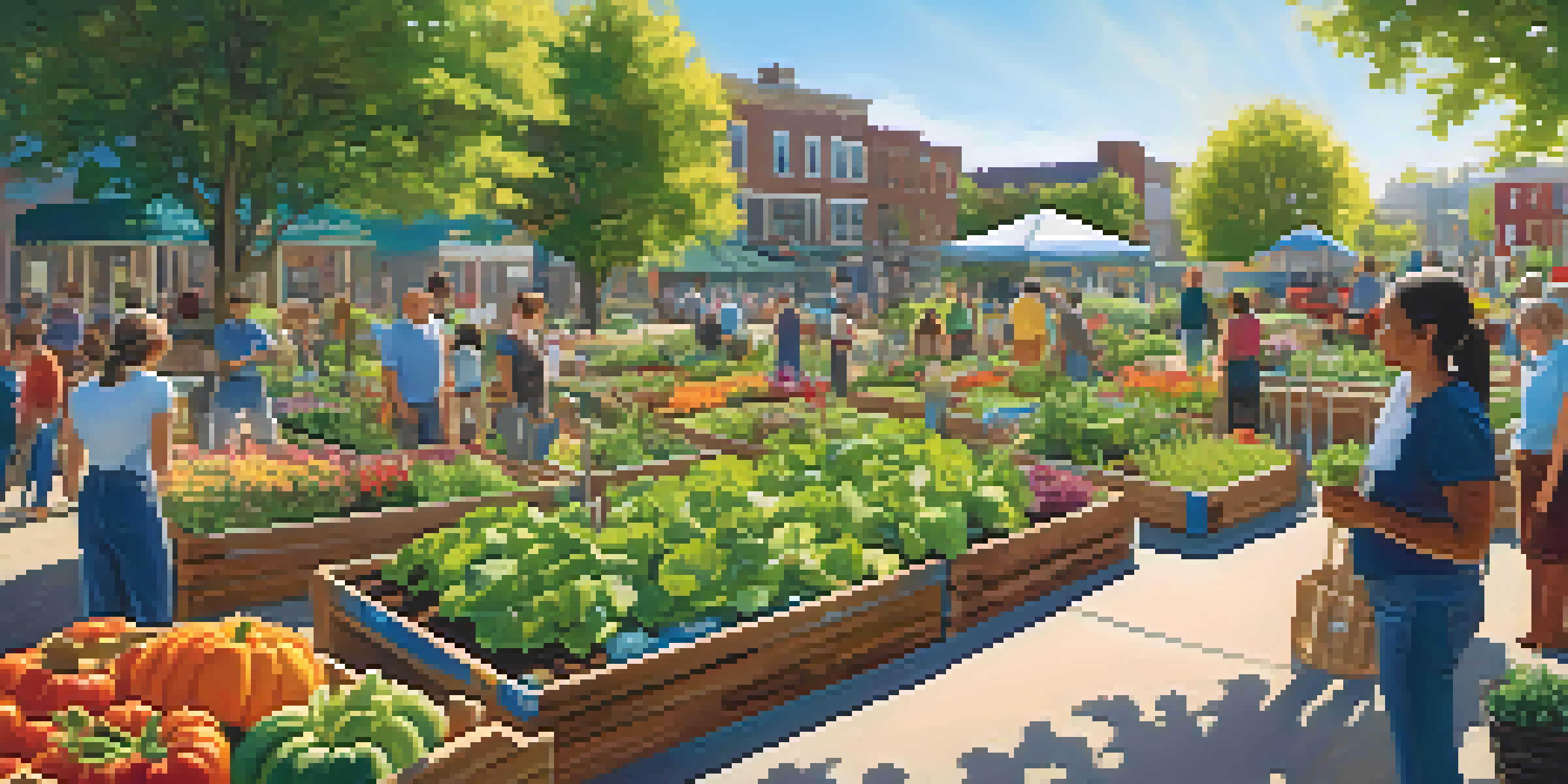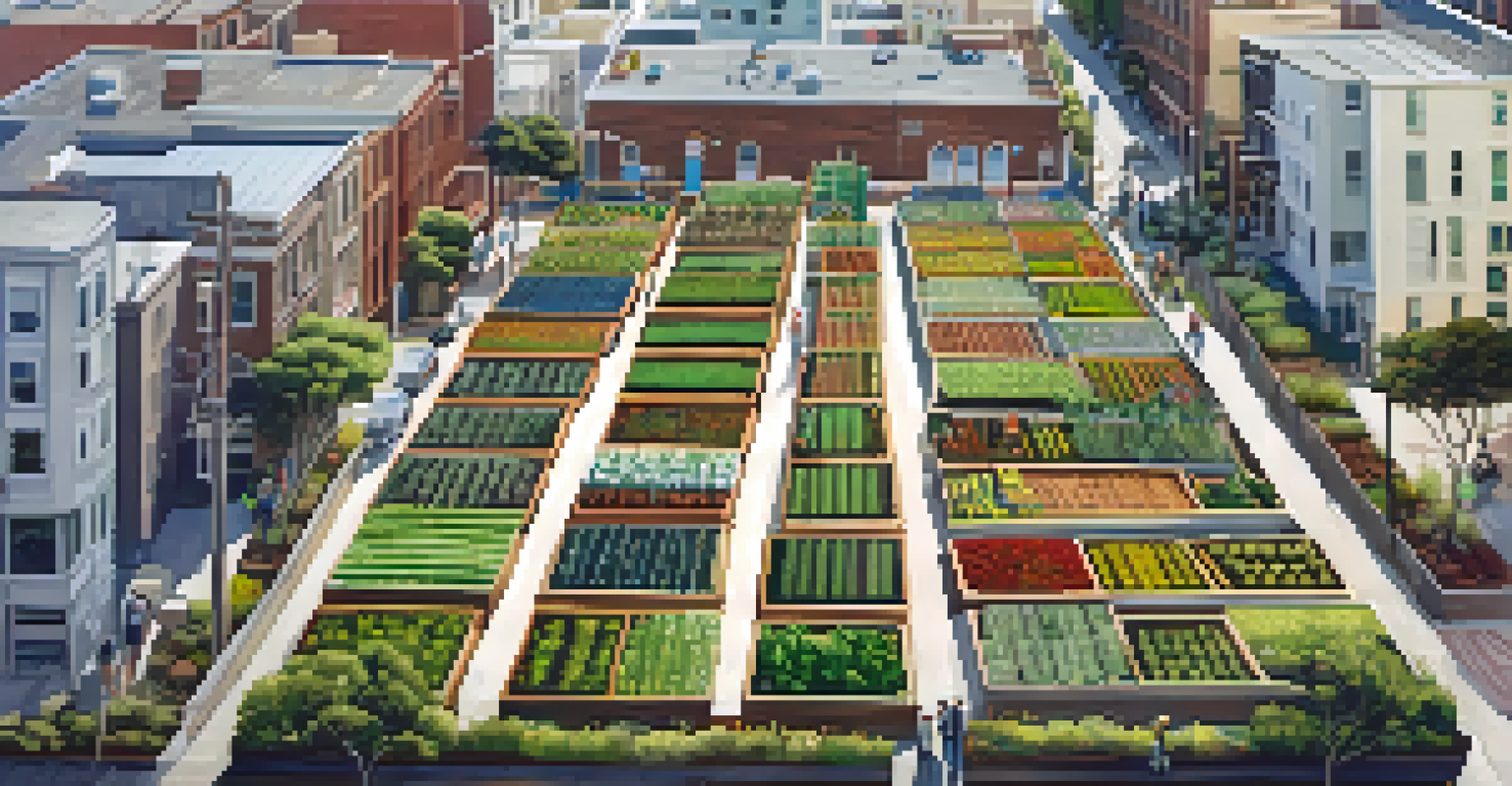The Role of Local Government in SF Urban Gardening Initiatives

Understanding Urban Gardening and Its Benefits
Urban gardening refers to the practice of cultivating food and plants in cities. It plays a vital role in enhancing food security, providing fresh produce, and fostering community engagement. In densely populated areas like San Francisco, urban gardens can transform concrete jungles into green spaces, offering a breath of fresh air and a touch of nature.
Urban agriculture is not just about growing food; it's about growing community.
Moreover, urban gardening contributes to environmental sustainability by promoting biodiversity and reducing urban heat. These green spaces also serve as crucial habitats for pollinators, which are essential for the ecosystem. By creating more gardens, cities not only beautify their surroundings but also take a step toward combating climate change.
The social aspect of urban gardening cannot be overlooked. Community gardens often become gathering spots for residents, encouraging interaction and collaboration. Through shared gardening activities, individuals can build friendships, learn about sustainable practices, and develop a sense of belonging.
The Role of Local Government in Urban Gardening
Local governments play a pivotal role in supporting urban gardening initiatives. They can provide resources, funding, and policy frameworks that enable communities to create and maintain gardens. By establishing programs that encourage gardening, local officials not only promote sustainability but also enhance the quality of life for their residents.

In San Francisco, the government has embraced urban agriculture by allocating public land for community gardens and supporting non-profit organizations that facilitate gardening projects. This approach helps alleviate barriers that often prevent communities from accessing green spaces, such as lack of funding or knowledge.
Urban Gardening Enhances Community
Urban gardening fosters community engagement by providing spaces for residents to connect, collaborate, and build relationships.
Furthermore, local governments can engage citizens by hosting workshops and events centered around gardening. These initiatives empower residents to take ownership of their neighborhoods, fostering a culture of cooperation and shared responsibility.
Funding Opportunities for Urban Gardening Projects
Securing funding is often one of the biggest challenges for urban gardening initiatives. Local governments can alleviate this burden by offering grants, subsidies, or low-interest loans tailored for community gardening projects. This financial support enables groups to invest in tools, seeds, and educational resources necessary for successful gardening.
The future will be green, or not at all.
In San Francisco, various city departments collaborate to provide grants specifically for urban agriculture. These grants can help transform vacant lots into productive gardens, benefiting both the community and the environment. Additionally, local governments can partner with private organizations to create funding opportunities that extend beyond traditional government resources.
Moreover, local governments can facilitate fundraising campaigns that encourage community involvement. By fostering a sense of ownership and pride, residents are more likely to contribute financially or volunteer their time, ensuring the sustainability of urban gardening projects.
Policies Supporting Urban Gardening Initiatives
Effective policies are essential for promoting urban gardening. Local governments can implement zoning regulations that allow for community gardens in residential areas. These policies ensure that urban gardening is legally recognized and can flourish without the fear of displacement or legal issues.
In San Francisco, the city has adopted policies that prioritize green spaces, integrating urban gardening into urban planning. This holistic approach encourages developers to incorporate gardens into new construction projects, creating a greener urban landscape.
Government Support is Crucial
Local governments play a pivotal role in promoting urban gardening by providing resources, funding, and policy frameworks.
Additionally, local governments can promote educational policies that teach residents about sustainable practices. By integrating gardening into school curriculums, children can learn the importance of food sources, nutrition, and environmental stewardship from an early age.
Community Engagement and Volunteerism in Urban Gardening
Community engagement is vital for the success of urban gardening initiatives. Local governments can foster this engagement by organizing volunteer days where residents come together to plant, weed, and maintain gardens. These hands-on experiences not only build skills but also strengthen community bonds.
In San Francisco, many gardens rely heavily on volunteers who dedicate their time and energy. Local governments can support these efforts by providing volunteer training and resources, ensuring that residents feel equipped and confident to contribute.
Moreover, engaging the community in decision-making processes regarding garden development can lead to more successful projects. When residents feel their voices are heard, they are more likely to invest in the care and growth of their gardens.
Challenges Faced by Urban Gardening Initiatives
Despite the benefits, urban gardening initiatives face several challenges. Limited space, funding constraints, and zoning laws can hinder the establishment of new gardens. Local governments must address these obstacles to create a supportive environment for urban gardening.
In San Francisco, high real estate prices can make it difficult to find suitable land for gardens. Local governments can take a proactive approach by identifying underutilized public spaces and transforming them into community gardens. This strategy not only provides fresh produce but also revitalizes neglected areas.
Challenges Hinder Urban Gardens
Urban gardening initiatives face challenges such as limited space, funding constraints, and zoning laws that need to be addressed for success.
Moreover, ongoing maintenance and community engagement are crucial for the sustainability of urban gardens. Local governments can facilitate workshops that teach residents about plant care, which helps ensure that these gardens thrive and continue to benefit the community.
Success Stories of Urban Gardening in San Francisco
San Francisco is home to numerous successful urban gardening initiatives that highlight the positive impact of local government involvement. One notable example is the Alemany Farm, a community-run urban farm that provides fresh produce and educational opportunities. Supported by city programs, it showcases how urban gardening can thrive with the right resources.
Another inspiring story is the Hayes Valley Farm, which transformed a vacant lot into a vibrant community space. Local government support played a significant role in its establishment, providing the necessary permits and resources. This project not only engaged the community but also served as a model for future urban gardening efforts.

These success stories demonstrate the potential of urban gardening when local governments actively participate. By investing in these initiatives, cities can foster healthier, more connected communities while promoting sustainability.